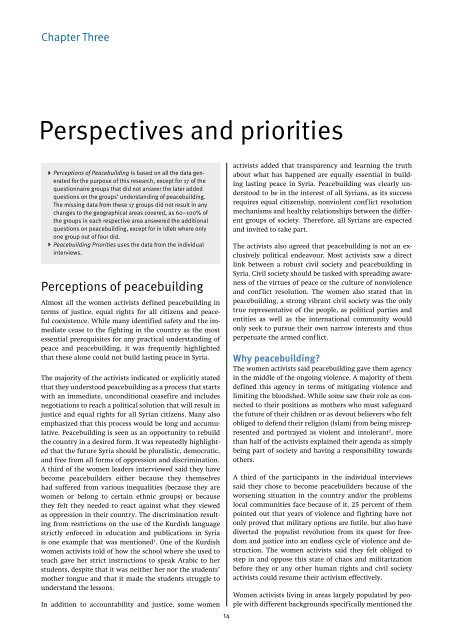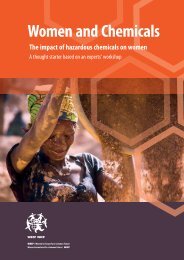future now”
YAO19
YAO19
You also want an ePaper? Increase the reach of your titles
YUMPU automatically turns print PDFs into web optimized ePapers that Google loves.
Chapter Three<br />
Perspectives and priorities<br />
4 Perceptions of Peacebuilding is based on all the data generated<br />
for the purpose of this research, except for 17 of the<br />
questionnaire groups that did not answer the later added<br />
questions on the groups’ understanding of peacebuilding.<br />
The missing data from these 17 groups did not result in any<br />
changes to the geographical areas covered, as 60–100% of<br />
the groups in each respective area answered the additional<br />
questions on peacebuilding, except for in Idleb where only<br />
one group out of four did.<br />
4 Peacebuilding Priorities uses the data from the individual<br />
interviews.<br />
Perceptions of peacebuilding<br />
Almost all the women activists defined peacebuilding in<br />
terms of justice, equal rights for all citizens and peaceful<br />
coexistence. While many identified safety and the immediate<br />
cease to the fighting in the country as the most<br />
essential prerequisites for any practical understanding of<br />
peace and peacebuilding, it was frequently highlighted<br />
that these alone could not build lasting peace in Syria.<br />
The majority of the activists indicated or explicitly stated<br />
that they understood peacebuilding as a process that starts<br />
with an immediate, unconditional ceasefire and includes<br />
negotiations to reach a political solution that will result in<br />
justice and equal rights for all Syrian citizens. Many also<br />
emphasized that this process would be long and accumulative.<br />
Peacebuilding is seen as an opportunity to rebuild<br />
the country in a desired form. It was repeatedly highlighted<br />
that the <strong>future</strong> Syria should be pluralistic, democratic,<br />
and free from all forms of oppression and discrimination.<br />
A third of the women leaders interviewed said they have<br />
become peacebuilders either because they themselves<br />
had suffered from various inequalities (because they are<br />
women or belong to certain ethnic groups) or because<br />
they felt they needed to react against what they viewed<br />
as oppression in their country. The discrimination resulting<br />
from restrictions on the use of the Kurdish language<br />
strictly enforced in education and publications in Syria<br />
is one example that was mentioned 1 . One of the Kurdish<br />
women activists told of how the school where she used to<br />
teach gave her strict instructions to speak Arabic to her<br />
students, despite that it was neither her nor the students’<br />
mother tongue and that it made the students struggle to<br />
understand the lessons.<br />
In addition to accountability and justice, some women<br />
14<br />
activists added that transparency and learning the truth<br />
about what has happened are equally essential in building<br />
lasting peace in Syria. Peacebuilding was clearly understood<br />
to be in the interest of all Syrians, as its success<br />
requires equal citizenship, nonviolent conflict resolution<br />
mechanisms and healthy relationships between the different<br />
groups of society. Therefore, all Syrians are expected<br />
and invited to take part.<br />
The activists also agreed that peacebuilding is not an exclusively<br />
political endeavour. Most activists saw a direct<br />
link between a robust civil society and peacebuilding in<br />
Syria. Civil society should be tasked with spreading awareness<br />
of the virtues of peace or the culture of nonviolence<br />
and conflict resolution. The women also stated that in<br />
peacebuilding, a strong vibrant civil society was the only<br />
true representative of the people, as political parties and<br />
entities as well as the international community would<br />
only seek to pursue their own narrow interests and thus<br />
perpetuate the armed conflict.<br />
Why peacebuilding?<br />
The women activists said peacebuilding gave them agency<br />
in the middle of the ongoing violence. A majority of them<br />
defined this agency in terms of mitigating violence and<br />
limiting the bloodshed. While some saw their role as connected<br />
to their positions as mothers who must safeguard<br />
the <strong>future</strong> of their children or as devout believers who felt<br />
obliged to defend their religion (Islam) from being misrepresented<br />
and portrayed as violent and intolerant 2 , more<br />
than half of the activists explained their agenda as simply<br />
being part of society and having a responsibility towards<br />
others.<br />
A third of the participants in the individual interviews<br />
said they chose to become peacebuilders because of the<br />
worsening situation in the country and/or the problems<br />
local communities face because of it. 25 percent of them<br />
pointed out that years of violence and fighting have not<br />
only proved that military options are futile, but also have<br />
diverted the populist revolution from its quest for freedom<br />
and justice into an endless cycle of violence and destruction.<br />
The women activists said they felt obliged to<br />
step in and oppose this state of chaos and militarization<br />
before they or any other human rights and civil society<br />
activists could resume their activism effectively.<br />
Women activists living in areas largely populated by people<br />
with different backgrounds specifically mentioned the



